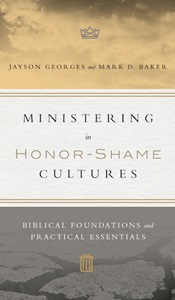Good News for the Ashamed
A veteran missionary reflects on an important new book about ministering in honor-shame cultures
Like most girls born to prostituted women, Lakshmi was familiar with shame. She had an unknown father, a mother who did “bad things with bad men” and a bed in a brothel home in an infamous red-light district in Asia. Then a Project Rescue outreach worker introduced Lakshmi to Jesus and His power to give her a new life and a new identity of honor as a daughter of God.
Lakshmi began to offer to pray to Jesus for those she knew in the red-light district who were sick. One day, a baby was dying, Lakshmi prayed with child-like faith and the baby was miraculously healed. As God honored this young girl’s prayers and faith, she was given a new name by the community in the local language: “The Girl Who Prays and God Answers.” God replaced Lakshmi’s shame with His unmistakable favor and the honor of a new name as a daughter of the true and living God.
Since Adam and Eve, there has never been a shortage of shame-producing conditions in human cultures: fatherlessness, homelessness, being unmarried, rejection, poverty, substance abuse, inability to have a child, failure to have a son, abandonment, being exiled, being conquered as a people, having certain diseases, and a history of sexual abuse or prostitution. So, given the universal crippling condition of shame, it is notable that it is so little addressed in Western theology. But as Jayson Georges and Mark D. Baker demonstrate in Ministering in Honor-Shame Cultures, it is amply addressed by God in His Word and in the life and message of Jesus. Along with forgiving sin, God’s mission throughout history has included restoring honor and dignity to those living in shame.
With large, growing immigrant populations arriving in America from traditional honor-shame cultures, the ability of ministers to articulate the gospel in honor-shame terms as well as in innocence-guilt terms has become a necessity. A staggering 80 percent of the world’s population today view life, relationships and faith through an honor-shame lens rather than an innocence-guilt one.
A staggering 80 percent of the world’s population today view life, relationships and faith through an honor-shame lens rather than an innocence-guilt one.
The biblical story of Jesus with the Samaritan woman at the well is a revealing one that has honor-shame dimensions to it. According to John 4, Jesus encountered a woman at the well whose life was defined by multiple sources of shame. She was born into a despised people, had multiple failed sexual relationships with men, was isolated from her community and condemned to eternal shame by pagan gods. Jesus represented the honored people of God, the honored gender, an honorable sexually pure life and He was the Son of the true and living Father-God. The contrast is dramatic.
Shame isolates. But God-bestowed honor is restorative and connects relationally to others and to God. Jesus’ gift to the Samaritan women of His presence, His revelation of who He was to her and the life-changing gift of truth with dignity made the encounter transformational. This interchange was so “shame-shattering” that the Samaritan woman was able to return immediately to the village and men who had disdained her to share good news. “Come, see a man who told me everything I ever did. Could this be the Messiah?” They listened, came to see Jesus, and many believed. And the woman who had been silenced and separated by her shame (and sin) from her community was used by God to introduce the Messiah to that very community. Jesus is the One who has the power to cleanse from sin and restore honor to women and men who receive Him as their Savior.
Shame isolates. But God-bestowed honor is restorative and connects relationally to others and to God.
Ministering in Honor-Shame Cultures contributes a deeper understanding of God’s redemptive work that will equip ministers to communicate more effectively to Majority World peoples. But its value goes beyond that. Only God knows how many Western believers and ministers struggle with the secret weight of shame for sins from the past because they have never heard that shattering shame is also part of Jesus’ gift of salvation. The authors set out to liberate readers from either an exclusively Western innocence-guilt theology or Majority World honor-shame theology to celebrate the very good news of both-and. Jesus came to forgive sin and shatter shame, to remove guilt and restore honor to people as sons and daughters of God.
Ministering in Honor-Shame Cultures provides a concise overview of honor-shame cultures as compared to innocence-guilt cultures. Stories from the authors’ own cross-cultural ministry experiences are interwoven with Biblical texts. Examples from current events and media reveal the powerful priority of maintaining honor and avoiding shame in every aspect of life for contemporary people around the world.
Part Two of the book goes through both Old and New Testaments surveying rich passages that unwrap the honor-shame perspective. Narratives that frequently have veiled meaning for Western readers suddenly come alive through the honor-shame lens. Appendices at the end include summaries of key Scriptures and biblical stories on which a biblical theology of honor and shame can be developed. Honor and shame are no small themes in God’s truth and redemptive work. By not communicating this vital aspect of the gospel, we can make God appear irrelevant and uncaring to billions of people in our world.
Half of Ministering in Honor-Shame Cultures explores the implications of this theme to practical ministry: spirituality, relationships, evangelism, conversion, ethics and community. Of particular interest is the nature of shame in Christian spirituality and its defining influence on individuals’ identity and relationships. This life-changing aspect of God’s promised work can take discipleship and spiritual formation to a whole new level of transformation.
Georges and Baker have contributed a valuable, very readable resource for U.S. ministers working multi-culturally, as well as those working internationally in honor-shame cultures. This book is an enlightening must-read for all who are passionate about sharing the whole of the good news with all people, whether they live in honor-shame or innocence-guilt cultures.
Beth Grant, Ph.D., is a veteran missionary to India, cofounder of Project Rescue—an international ministry to victims of sex trafficking, and author of Courageous Compassion. She is also an ordained minister in and executive presbyter of the Assemblies of God (USA).
 Book reviewed: Jayson Georges and Mark D. Baker, Ministering in Honor-Shame Cultures: Biblical Foundations and Practical Essentials (Downers Grove, IL: IVP Academic, 2016).
Book reviewed: Jayson Georges and Mark D. Baker, Ministering in Honor-Shame Cultures: Biblical Foundations and Practical Essentials (Downers Grove, IL: IVP Academic, 2016).
Influence Magazine & The Healthy Church Network
© 2025 Assemblies of God

